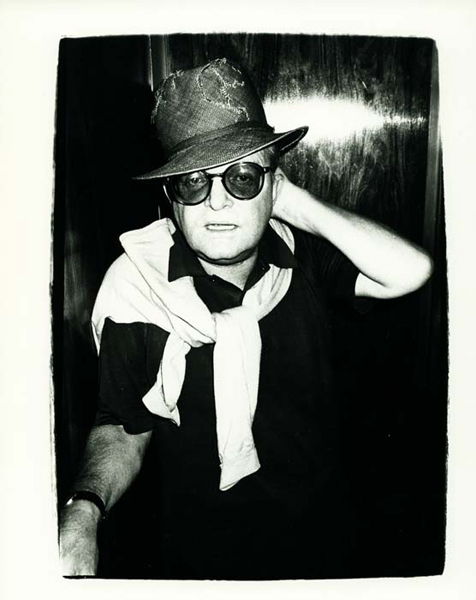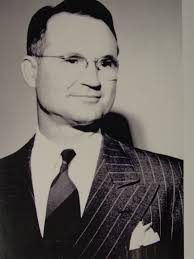Subscribe to:
Post Comments (Atom)
skip to main |
skip to sidebar



Truman Capote

What position comes closest to your view about the punishment of the Clutter family murderers?
Followers
Blog Archive
Herb Clutter

What question do you most want answered in reading the book?
Kansas Plain

I do not believe that Truman Capote is giving an opinion on the death penalty seeing as Dick, who grew up somewhat impoverished but in a healthy environment, also received the death penalty.
ReplyDeleteAlthough some readers may feel sympathetic towards Perry, i believe that it has nothing to do with his impoverished lifestyle but rather the new elements of his personality that are a result of his incarceration.
I believe that Truman Capote enhanced the personalities of the murderers to add a novelistic element to the journalism behind this story. Truman Capote enhanced these characters for the sole purpose of sharing the Clutter's story in more depth, not to pass along a message about the death penalty. I believe that Capote had no intention of supporting a stereotype with the descriptions of Perry's lifestyle growing up.
Aside from Dick, the other men on death row at the penitentiary seem to have lead relatively normal lives. Lowell Lee Andrews, the, "brilliant son, the adored brother" (312), led a very normal life. he was intelligent and brought up well by his family who adored him. However, he killed them and is now on death row. If Truman Capote was trying to make a point about the death penalty, he would not have included a lengthy portion of the fourth section of In Cold Blood about Andrews' normal, simple life with a loving family growing up.
I believe that there is no evidence of Capote making a point about the death penalty being related to an impoverished life style.
This comment has been removed by the author.
ReplyDeleteTruman Capote’s portrayal of Perry is without a doubt used to illustrate the Capote is against the death penalty. Perry is depicted as a lonely man who grew up with a harsh lifestyle. Throughout the book, Perry has trouble due to his accident and to add to this, his family is extremely messed up. During the trials, Capote feels the need to add Perry’s life-story statement to the story. It informs the reader of how truly sad Perry’s life is. The statement tells the reader that Perry’s mother cheated on his father with several other men (274). It goes into greater detail about the humiliation caused by the nun who beat Perry. The statement informs the reader that Perry’s relationship with his brother was really bad as well. (274). All of these minor details make the reader feel bad for Perry. One then concludes that the murders were because of Perry’s hard life. Perry says, “The [the Clutters] never hurt me. Like other people. Like people have all my life. Maybe it’s just that the Clutters were the ones who had to pay for it” (302). Perry’s tough life almost serves as a justification for the murders and thus Perry does not deserve the death penalty. Additionally, throughout the last segment of the book, Capote adds parts of the insanity plea. When the doctor is on the stand, he is only able to answer a yes or no question of whether Perry knew right from wrong. On page 298, Capote added what the doctor would have said, had he been allowed to. This illustrates that Capote is quietly informing the reader that the doctors did think Perry was insane, and therefore the death penalty is not justified. Capote goes on to publish an article called “Murder Without Apparent Motive – A Study in Personality Disorganization” (298). Everything in this article talks about criminals who had personality disorders but were given the death penalty unfairly. Although the doctors could tell that these criminals were insane, they were wrongly convicted anyway. These descriptions fit Perry perfectly. This is Capote’s way of saying that Perry was also wrongly convicted because he was just like these other men. Moreover, Capote gives a vivid description of the death sentence which further illustrates his opposition to it. The words of the execution on page 339 before he kills Dick are, “The Lord giveth, the Lord taketh away.” This can be interpreted as the idea that God gives someone life, and God takes away life. If one is murdering someone, it begs the question, “Who are we to play God?” because only God can take away life. It is not humanity’s job. Also, Capote put in a conversation between a guard and a reporter. The guard said that the prisoners did not feel any pain and the reporter asks almost sarcastically, “Are you sure? I was standing right close. I could hear him gasping for breath” (340). Followed by a question about sedatives, the guard replies that they do not give them sedatives. Capote makes the prison seem at fault because he makes it obvious that they do experience pain, and the prison does not treat the prisoners humanely. Finally, during Perry’s execution, Capote talks about Perry’s legs dangling like a child. Dewey saw, “childish feet, tilted, dangling” (341). This is symbolic because it represents that Capote feels hanging someone is just as treacherous as killing an innocent, naïve child.
ReplyDeleteTruman Capote seems to be making a personal statement against the death penalty. He writes much about the background of how the death penalty is used in Kansas and in the United States, in general. Capote gives statistics about how many people were on death row at the time of the trial, “Now, at that time-April 1960-there were in United States prisons one hundred and ninety persons awaiting civil execution.” (311) Capote also gives a history of capital punishment in Kansas. It is hard to believe he would go into so much detail if he did not want to raise the question of whether or not we should have the death penalty.
ReplyDeleteThe other point that Capote makes concerns the M’Naghten Rule. This rule examines the extent to which a psychologist can testify about the mental state of the accused. In the case of Perry’s trial, the psychologist could only say if Perry could tell right from wrong at the time of his crime. Dr. Jones, the psychologist could not testify as to his full report on Perry Smith which detailed Perry’s brutal childhood and included the phrase, “Perry Smith shoes definite signs of severe mental illness.” (296) Capote would not have included all of the report that Dr. Jones could not use at the trial if he was not making a case against the death penalty.
Capote's disagrees the death penalty and I disagree with Capote.
ReplyDeleteCapote disagrees with Perry's punishment; he believes that Perry's upbringing and background is the reason behind Perry's violent decision towards the killing of the Clutter family. In section four we are reminded yet again of Perry's lonely and troubled life; his dead brother, the troubles his mother and father faced and the non existent love between him, Cookie and the nun who beat him. In Perry's final moments the reader is faced with Capote's view on how he believes the Perry's hard life is the reason behind his decision to follow through with the murders (302). Capote uses the doctor to represent his belief that Perry does not know right from wrong and that the death penalty is an unfair punishment for an insane person, “Perry Smith shows definite signs of severe mental illness.” (296). Capote believes Perry did not know what he was doing; I disagree with this.
However, I believe that Perry does know what he was doing. I think Perry had to have known what he was doing; and therefor he does deserves the death penalty. During the killing of the Clutters Perry knew right from wrong. He knew it was wrong for Dick to rape Nancy Clutter, and so he put a stop to it. He prevented the young girl from being raped by a criminal; if he knew that was the right thing to do, then he must have known killing four people was the wrong thing to do.
I do believe that Truman Capote is making a point about the death penalty. The reason that I do believe this is for several reasons. To start, when referring to Dick and Perry's punishments, the jury and witnesses mention Perry's life style several times. They mention about how he was very poor, was abused, abandoned, and very unfortunate all together. This is mentioned several times because the jury and witnesses are stressing that maybe the death penalty is a little harsh. Maybe the death penalty and capital punishment are too extreme for this type of murder, especially for Perry and the hard life that he came from himself. As well, Capote brings up the article written by the doctor. This article talks about sane murders or rational murders and insane murders or irrational murders. The doctor talks about how there is no worry for insane murders, but there are for sane murders. Perry's crime was a sane murder because her clearly had some illegitimate reason to kill the Clutters, but still did it. Therefore, it shows that Capote slightly feels bad for Perry as it is hard to understand specifically why he did what he did. Also, before Perry is about to be killed, he is asked if he has any last words. He says, "it's a helluva thing to take a life in this manner. I don't believe in capital punishment, morally or legally" (340). This quote clearly shows that Capote is suggesting capital punishment as a bad thing, as he states that Perry disagrees with capital punishment. Obviously Capote has some input about this subject, or he would not make this point so continuous throughout the story.
ReplyDeleteI believe that through Capote giving a sympathetic portrayal of Perry, he is protesting the death penalty. Capote portrays Perry as someone who had no control over his action because of his violence-ridden and extremely harsh childhood. This theme does not just occur in Section 4, but it occurs throughout the book. I believe that Capote includes the theme throughout the book to add the sympathy that the reader feels towards Perry, thereby increasing the dislike of the death penalty, especially when used for Perry (personally I felt no remorse for Dick). I believe this because the story about Perry’s life did not serve any journalistic purpose, and therefore the purpose must be novelistic. That means it could just be used as a device to see into Perry’s character, or something with a larger purpose. Although in the beginning Capote may not have been looking for a way to protest the Death penalty, but realized that this was his chance to do so. I believe that Capote makes two other objections to Capital punishment. The first of these is when he writes about Perry going on a hunger strike. I believe that this symbolizes Capote protesting against the death penalty because there is no real reason for this to be included in the story if it was not a device for Capote to protest. The second example lies in this quotation. “childish feet, tilted, dangling” (341). In saying this, Capote is calling the act of the death penalty childish.
ReplyDeleteTruman Capote's cruel description of the execution of Dick and Perry, especially Perry, gives the reader an inhumane view of the scene. After avoiding death for "almost two thousand days, the Kansas Supreme Court decreed that their lives must end between midnight and 2:00 A.M." Even though it seems that justice is finally being served, the Corner is still known as a dark and bleak place. Dick surprises everyone by taking his hanging like a man. He shakes hands with the very people who wanted him to hang and asked if they could attend. One of them even admits that he "'never would have believed he had the guts. To take it like he did. I had him tagged as a coward.'" This statement shows that even in the face of death, Dick still wants to be calm. Perry, death really gives a view of the heartlessness of capital punishment. Before he is executed, he makes a final statement. “It would be meaningless to apologize for what I did. Even inappropriate. But I do. I apologize.” This statement shows confirms what the readers think of Perry earlier in the book. We already knew that Perry regrets what he has done, this saying shows how sorry he is. Even though he knows that the apology won’t save him from his fate, he makes the claim. The actions of these two murderers before their execution draw some slight pity. It is slightly apparent that these two men, or at least Perry, may have redeemed themselves if they weren’t executed. Capote also describes how gruesome the act is. Agent Dewey couldn’t bear to watch the scene. He closed his eyes until Perry was dead. It’s a terrible sight to see. However, he listens to the “wisdom” of his partner. “’ He don’t feel nothing. Wouldn’t be humane if he did.’” He said this even though it took Dick 20 minutes to die. No one wants to imagine the torture Dick might have been going through in those twenty minutes. Capote is subtly bringing these cruelty of the capital punishment in the final hours of Dick and Perry.
ReplyDeleteTruman Capote is seemingly making a point about the death penalty that while the public opinion of typical death row mates is that they are soulless criminals. Truman Capote has developed sympathy for Dick and Perry throughout the entire book, and there is certainly a reason for it. Several past blog prompts have been on the topic of the development of sympathy of the victims. Capote is an accomplished writer who would not do this without a purpose. The purpose of developing sympathy is to show that the death penalty may fit the punishment, but doesn’t necessarily fit the person. While people may find the death penalty to be a legitimate punishment for those without knowing the people themselves, one must look from the perspective of those involved, as Truman Capote has forced the reader to do. He obviously disagrees, for the death penalty is an extreme that is not appropriate for the situation, and his bias can sway the reader.
ReplyDeletePerry’s portal is making a statement about the death penalty. He is shown as weak and broken, the product of a shattered childhood. Capote has sympathy for Perry. It is known that Capote had an obsession like fixation on Perry and his story. Even if he isn’t trying to make a statement about the death penalty in all cases, he is trying to make a point out of it in Perry’s case. According to an article about the book, Ande Parks and Chris Samnee write, Capote had a relationship with Perry throughout his last days, “Capote felt some sort of intense connection with Smith that did not exist with Hickock…this developing friendship through several visits between the author and murderer in his jail cell.” For Capote, Perry isn’t just a character in his book like Dick is, but Perry is a person he has grown to like and have a close friendship with. The article goes on to state, “For Capote, the relationship with Smith was devastating. Although he did return to Kansas to see the men die, he was unable to watch Smith hang and fled from the prison.” Capote is not trying to make a statement about the death penalty, but a statement about Perry.
ReplyDeleteSource: http://www.bookslut.com/features/2005_10_006772.php